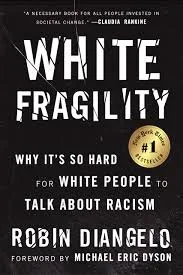White Fragility
If you enjoyed this review, please consider purchasing this book from my Amazon Associates link: https://amzn.to/2TpxmdV. The commissions I receive from your purchase help pay for the costs of running this website. Thanks for your support!
White Fragility was written by Robin DiAngelo, a white woman with a PhD and decades of experience in diversity training. Her perspective was helpful for me, especially as a fellow white woman, but I do think that if we’re seeking to learn about racism, we should throw attention and cold, hard cash towards black authors. So, one of my next reads will be How to Be an Antiracist. Just wanna get that out there.
White Fragility asks white people why we act so defensively to accusations of racism. DiAngelo redefines what racism means so that we stop freaking out when something we do is called racist and start actually learning from our mistakes. When we view racism as binary (racist = bad, not racist = good), then we get all desperate to deny racist actions because we don’t want to be seen as a bad, racist person. In reality, we do racist shit all the time. That doesn’t make us morally irredeemable, but we should do something about it rather than just trying to save face.
Racism is about power... and white males have a lot of power. Claims that white people are losing their power are patently false, and DiAngelo includes some jarring statistics to show it. For example, eight men own the same amount of wealth as do the poorest half of the world. Great. Of the fifty richest people on earth, twenty-nine are American. Of the twenty-nine, all are white, and all but two are men-- Lauren Jobs inherited her husband’s wealth and Alice Walton inherited her father’s. Of course, plenty of white people experience hardship but they do not experience *racism* because overall, white people hold power within institutions.
I could go on and on about how capitalism is imperfect and we should stop jerking off to it so much, but instead, I’ll list a few takeaways from the book that I’ve been mulling on:
White supremacy is the positioning of whites as the norm/standard for humans (and people of color as the deviation from that norm). Writers like Dickens, Hemingway, Steinbeck, Twain, etc. are seen as “representing the universal human experience” and then we turn to Toni Morrison when we want the “black perspective”. This kind of socialization affects us deeply. It’s one reason why studies show racism manifesting itself at a really young age.
When white people reminisce about the “good ‘ol days”, we’re being insensitive and oblivious. People of color do not have the luxury of reminiscing. This is one reason why the slogan “Make American Great Again” is not cool.
The practice of our lives is telling. We mostly live segregated lives (myself included). We can say that we want to be less racist, but what kind of example do we set for our kids when we are ostensibly fine with remaining segregated?
Overall, I recommend White Fragility and give it 5 out of 5 flames. DiAngelo has so many stories that feel like a punch in the gut, either because they remind me of myself or of other people in my life. Racism hurts people; shouldn’t we be in the business of bettering ourselves as humans and trying to lessen the hurt?
White people benefit from the current system, so the onus is on us to change it from our positions of power. We must continue to ask how our racism manifests itself, not if. I think that there are probably “better” books about systemic racism, but this is a good start.


